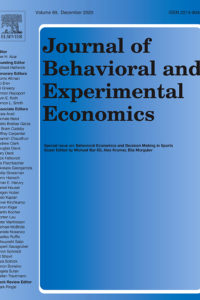Dijk, Wilco van
Fellow

The Impact of Financial Scarcity on Decision-Making
What are the psychological effects of having too little money to make end meets? And how do these affect people’s choices and decisions? These are two questions that the current project tries to answer in its research on the impact of financial scarcity on decision-making.
Project Description
Despite the Netherlands being one of the wealthiest countries in the world, 4 out of 10 Dutch households struggle to make ends meet, and 1 in 5 has serious financial problems. Financial hardship is a pressing issue; excessive debts can lead to severe stress, poor health, domestic violence, and suicide. Moreover, it hinders active participation, and leads to stigmatization and social isolation, thereby undermining social cohesion in our society. Recent work suggests that financial scarcity impedes cognitive function and leads to poor decision-making, thereby often worsening an already problematic situation. In the current project, research on the relation between financial scarcity and decision-making is reviewed and obtained insights are made available to academics, policy makers, and professionals working in the field of debt and poverty.
Selected Publications
1) Mooijman, M., Van Dijk, W.W., Van Dijk, E., & Ellemers, N. (2019). Leader power, power stability, and interpersonal trust. Organizational Behavior and Human Decision Processes, 152, 1-10.
2) Van der Werf, M. M. B., Van Dijk, W. W., Wilderjans, T. F., & Van Dillen, L. F. (2019). The road to the piggy bank: Two behavioral interventions to increase savings. In: K. Sassenberg & M. L. W. Vliek (Eds.). Social psychology in action: Evidence-based interventions form theory to practice. Basel: Springer Nature Switzerland AG.
3) Van Dijk, W. W., Van Dillen, L. F., Rotteveel, M., & Seip, E. C. (2017). Looking into the crystal ball of our emotional lives: emotion regulation and the overestimation of future guilt and shame. Cognition and Emotion, 31, 616-624.
